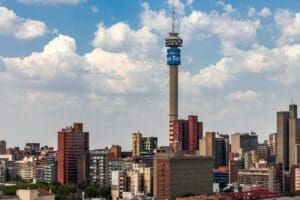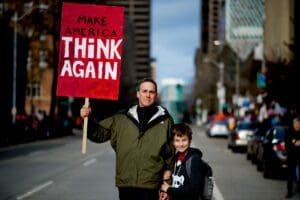By Holly Bancroft and Archie Mitchell
See original post here.
The number of children living in extreme poverty has nearly tripled in the past five years, according to a new report that lays bare the impact of the cost of living crisis on hard-hit families.
A soaring number of households are skipping meals to save money, borrowing from relatives, and turning to food banks as they struggle to meet their most basic needs, including staying warm and dry, clean and fed.
The report, by the Joseph Roundtree Foundation, shows that a total of 3.8 million people experienced destitution last year – a 61 per cent increase from 2019. The number of children was 1.04 million, up from 362,000 in 2017.
Campaigners and politicians lambasted the findings, with Action for Children calling the crisis a “disgrace that shames us all”.
Tony Lloyd MP, a member of the all-party parliamentary group on poverty, said the scale of the problem is a “scandal”. “Every political party should be saying, ‘We are going to fix this,’ because it is about having a basic standard of decency in our society,” he said.
“No child should have to suffer from a lack of warmth, to live in a home that is not dry, or to not be fed properly. In Britain, the fifth-richest country in the world, these should be the staples of our society.”
Liz Kendall, Labour’s shadow work and pensions secretary, said the report was a “damning indictment of this Conservative government”.
The former children’s commissioner for England, Anne Longfield, warned that there must be an “urgent laser-like focus from within government to tackle child poverty so that we can consign childhood destitution to the history books and Dickensian novels where it belongs”.
A spokesperson for the government said that its “number one priority” was driving down inflation. “We are providing support worth an average of £3,300 per household, including raising benefits by over 10 per cent this year, and are increasing the national living wage again,” they added.
According to the survey, food was the main thing that the poorest families couldn’t afford, with nearly two-thirds of destitute households reporting that they were going hungry.
Single working-age adults were the most likely to be living in destitution, with single parents with children the second worst affected. One mother told researchers that she could only eat one meal a day, while another said she had not done any washing for two weeks because she couldn’t afford washing powder.
Rising costs at the supermarket were also affecting families. Mounira, a working mum of two who turned to a local food bank for help, said: “I constantly face the dilemma of having to choose between giving my family a healthy and balanced diet and a healthy social and active life. Our grocery shopping cost has almost doubled, so did our bills, yet our salaries have not followed, so I have had no choice but to seek help.”
London had replaced the North East as the worst-hit region, analysts found. Newham council had the highest level of extreme poverty in the country, with Manchester and Middlesbrough coming second and third respectively.
For the first time in the 2022 study, destitution was broken down by ethnicity, with analysts finding that the rate of destitution among Black respondents was three times higher than their population share.
The report – the fourth in a series of Destitution in the UK studies published regularly in recent years – puts the rise down to a combination of very low incomes, the rising cost of living, and high levels of debt.
But it also said that the social security system is failing to protect people from destitution, with almost three-quarters (72 per cent) of those who were destitute last year being in receipt of benefits.
The report combined an analysis of data with a survey of nearly 4,000 of the poorest households. Out of those surveyed, more than a quarter of households said they had no spare cash at all after they had paid their housing costs. More than half had incomes below £85 per week after they had paid for essentials.
One in 10 respondents were in paid work, with one single man who was working on a zero-hours contract telling researchers how he had sometimes to skip meals because his salary didn’t cover basic expenses.
He said: “I just get a bag of rice, five kilos of rice. That is about £12. I do myself a vegetable stew and normal stew, and leave it in the freezer in small bowls.” He said he tries to have something to eat every day, even if it is just a yoghurt, but “there are days I go without”.
One mother said: “I only eat one meal a day. I’ll probably have a bit of toast when I get home from work, but I won’t eat anything else till tea. The kids will have breakfast, obviously, and then they’re at school for their lunch, but I tend to just eat at night-time because I can’t afford to buy things for me to eat during the day.”
Another said she had noticed a rise in the price of toiletries: “My eldest daughter has a disability and is incontinent at night-time, so she has to wear night-time pads. They’re not covered on the NHS so I have to purchase them myself – they’re £8 for 12 pads.”
One elderly man said he had cut back on buying clothes. “I get clothes from churches and things like that,” he said. “My brother gives me some clothes. I do buy a few trainers and stuff like that, but I haven’t really bought clothes for a long time, to tell you the truth.”
Responding to the report, Action for Children called on the chancellor Jeremy Hunt to “deliver on his manifesto promise to use the benefits system to reduce child poverty”.
Imran Hussain, director of policy at the charity, said: “At an absolute minimum, all benefits must be increased by inflation in the usual way. That this is even in doubt is extremely alarming.”
Charlotte Hill OBE, CEO of the Felix Project, said that the food banks and community projects the charity supports are in desperate need of more food in order to meet increasing demand. She said: “Every single one of the charities we support wants more food, and there are over 650 new organisations on our waiting list that we cannot help.”
Labour MP Lyn Brown said her constituency casework had doubled. “People are in great difficulty, presenting with high levels of debt,” she said. “Schools tell me that children are lucky to get one meal a day at home. Many constituents are working more than one job, and still can’t afford the excessive rents.”
A government spokesperson added: “There are 1.7 million fewer people in absolute poverty than in 2010, including 400,000 fewer children, but we know some families are struggling, which is why we are providing support.”






















